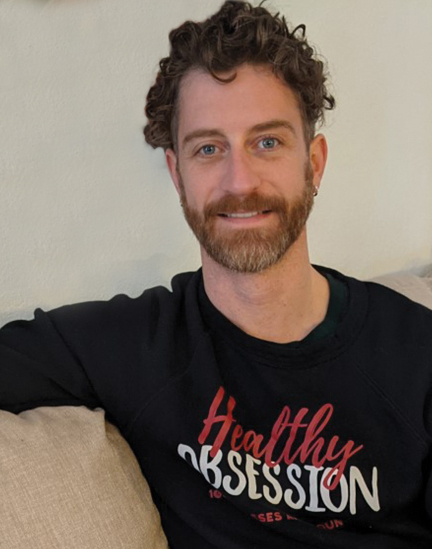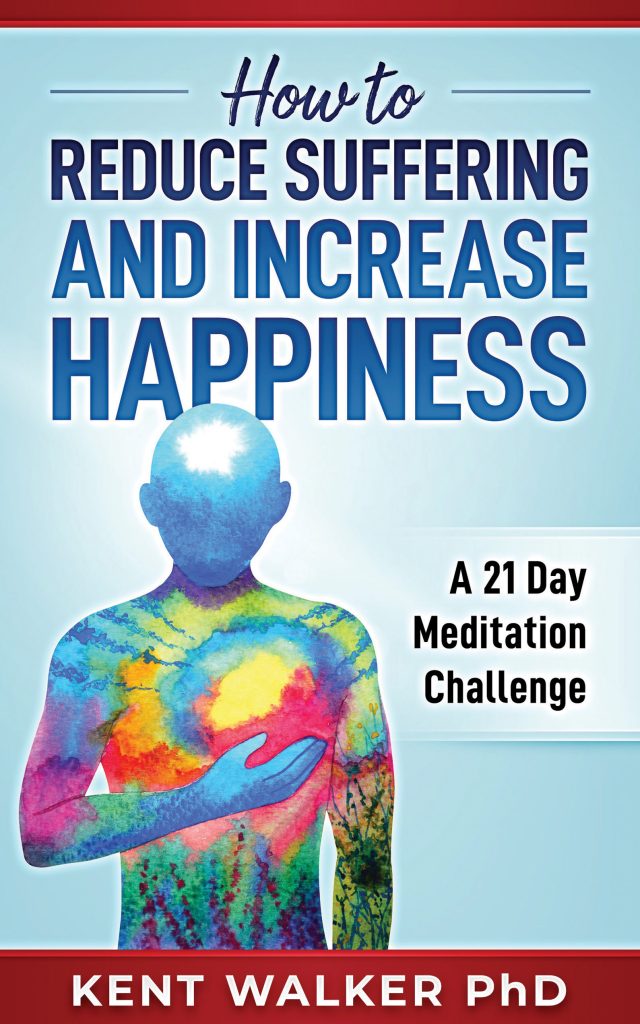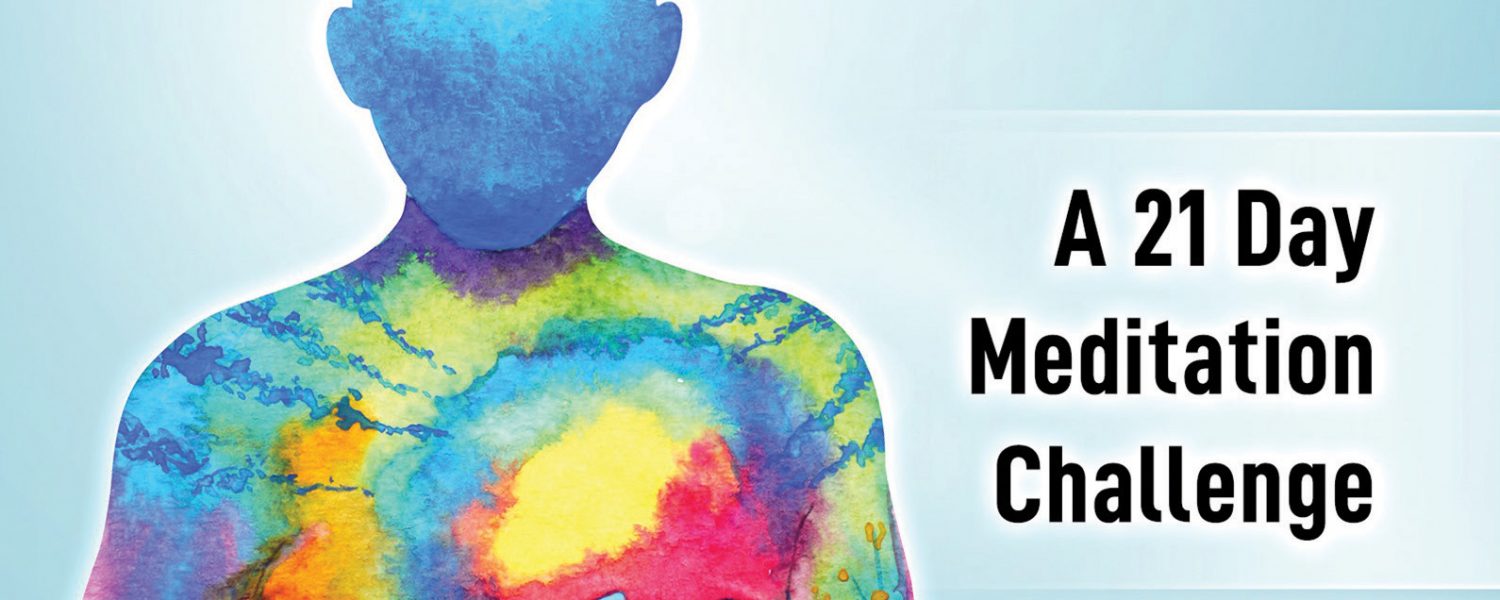Kent Walker’s New Book Proposes
a 21-Day Meditation Challenge
Story by Michael Seguin
Kent Walker is a man that dwells in two worlds. On the one hand, he’s firmly rooted in academia. For the last 11 years, he’s taught a variety of courses at the University of Windsor, before settling into his current role: the MBA Director at the Odette School of business. In addition, his wife, Mesia, cofounded Modo Hot Yoga. But, this mover and shaker also has a distinct spiritual side.
“When I was doing my PhD, I was in pursuit of that Western core belief about how we can understand the world,” Kent explains. “So, it was more about going into science in trying to understand the world that way. And I’m still a professor today. I still do research. I think there’s tremendous value in what I studied. But, one of the things I started noticing was that my research wasn’t answering some of the fundamental questions. Stuff like, ‘why do we suffer? What is our purpose here?’”
The more Kent went into science, the more he realized that the tools he had been given were not helping him find the answers to the larger questions that had been troubling him.
“Gradually, I became turned off by Western methods,” Kent states. “I started looking into Eastern philosophy. So, even before my wife opened the yoga studio, I’d been pursuing it, to some extent.”

After relocating to Windsor back in 2009, Kent became a certified yoga instructor.
“I did a one-month certification course in Nicaragua,” Kent recalls. “It was pretty amazing! I was on the beach every day. I got to swim in the ocean every day.”
In addition to several other courses and certifications, Kent also underwent a vipassana.
“For 10 days, you don’t talk,” Kent explains. “You don’t even make eye contact with anyone. There is also no dinner! I ended up losing about 15 pounds. All you do is meditate for about 11 hours a day. They say that this practice is Buddha’s biggest lesson for the world. I recommend it for anyone. It was a very interesting experience.”
The more time Kent spent in yoga studios and classrooms, the more he realized how he could combine his (pun very much intended) two schools of thought.
“In the yoga studio, when I’m trying to teach my students a lesson, I can literally have them feel it within their body,” Kent states. “Once they feel in their body, they have a much greater understanding of it. But, everything I teach at the University is very lecture-based. Still, I eventually discovered that I could make our students more socially and environmentally responsible if my lessons incorporated an aspect of doing. I had to encourage my students to go out and do something. Without that, I couldn’t create that change in their perception. That became my motivator for this book.”
Kent recently compiled all his various coursework, accumulated throughout his travels in both worlds, into one informative, accessible book: How to Reduce Suffering and Increase Happiness: A 21 Day Meditation Challenge.
“At the yoga studio, we’ll do these 30-day challenges that are very, very popular,” Kent explains. “It’s all about the power of the challenge. It will motivate people and help them learn things about themselves along the way. So, I thought a meditation challenge would be very effective.”
Each of the sessions included in the book follows the same structure: a key lesson that builds off the previous lessons, a midpoint check-in and information about how you can apply the lesson to the rest of your day. Along the way the reader will discover stories about Buddha, yoga and yogis, monks and more. Applicable for beginner and advanced meditators, the program will show you how to use your body to experientially understand reality, question dominant paradigms and, ultimately, how to use a meditation practice to reduce suffering and increase happiness.
“Once you feel the lessons within your body, it changes the way you see the world,” Kent states. “And it’s all framed within this 21-day meditation challenge. Twenty-one days is ideal, because the research shows us that it takes about 21 days to form a new habit. Hopefully, by reading this book, you’ll have picked up a healthy habit that will remain with you for the rest of your life.”

The book covers a variety of topics, including the power of breath awareness, how to let go of stress in the body (as well as intrusive thoughts), how to use a meditation practice to create presence, become a better listener, to stop attaching to thoughts, to feel whole and perfect as you are, to work with your dark side or shadow, to embrace a lack of purpose and to take responsibility through a full exploration of choice.
And these lessons, Kent stresses, are both contemporary and ancient.
“One of the things that fascinated me—something I even teach at university—is the interconnectedness of things,” Kent explains. “There’s things like non-vocality and what Einstein called spooky action at a distance. They’ve found that the rotation of one particle can affect the rotation of another. One small particle, down to the quantum level, can affect another particle, potentially lightyears away. There’s some connection between things. But these more recent scientific discoveries were being talked about thousands of years ago. Ancient gurus could go within their own bodies and understand that.”
This ancient theme is all about understanding the micro level to understand the macro level. It’s all about understanding the body to understand the universe. And rather than focusing on a single philosophy, the book encompasses a wide breadth of knowledge.
“The book doesn’t just stick to one school of thought,” Kent states. “It touches on Buddhism, Gnosticism, alchemy and history. It brings everything together. For 21 days, you’ll have a different key lesson to focus on. And at the end of each chapter, there’s a discussion about how to keep applying those key lessons throughout the day. In yoga, we say that you start the work on the mat, but it continues off the mat.”
However, despite the scope of the book’s ideas, it is incredibly accessible, both for experienced meditators and for newcomers.
“The first week includes 10 minutes of meditation,” Kent explains. “The second week is 20. The third is 30. And that is deliberate. A Harvard study found that, in order for people to change the structure of their brain, the average length of time required is 27 minutes. So, I’m encouraging you to hit 30!”
The book has been out since January. And already, the positive responses are flooding in.
“I know some people who are in the middle of the challenge right now,” Kent states. “And my question for them all is: ‘Are you happier?’ So far, responses are very positive. People are saying that it’s helping them a lot. And I know a few more who are going through it a second time.”
And the book’s key lessons may now be more important than ever, in this time of heightened uncertainty.
“Now is a very difficult time, mental health-wise,” Kent explains. “But now, we also have more time than we normally do. This book teaches great coping skills. And it’s such a great time for self-reflection.”
How to Reduce Suffering and Increase Happiness: A 21-Day Meditation Challenge is available on Amazon. It is also now available in audio format on most platforms.




Add comment